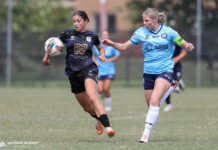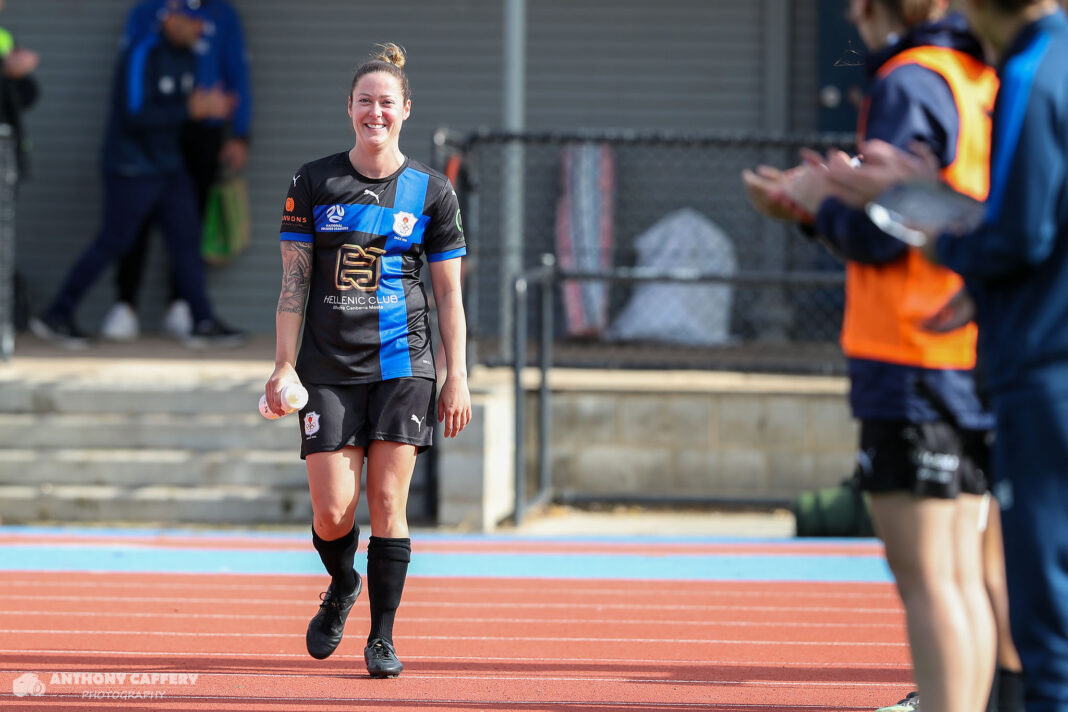

When it comes to living a football life in and around the Canberra women’s football scene, Michaela Thornton has done it all. From her earliest milestones with Australian schoolgirls tours and two seasons with the Canberra Eclipse in the Women’s National Soccer League to her extraordinary NPLW experiences, Thornton has a range of football experiences like no other. Her ability as a physiotherapist has seen her work on the national scene with Canberra United (youth league and women). She also has two Julie Murray medals for best on ground in a Capital Football NPLW grand final, and has captained national futsal teams.
We were fortunate to speak with Thornton the morning of her 200th NPLW game; fittingly, it was between her current team Canberra Olympic and the team she was so closely associated with for over a decade, Belconnen United. On her way to the interview, she had calculated that this is remarkably her 21st season of top-grade women’s football, so the ‘real’ number of games is far higher than 200.
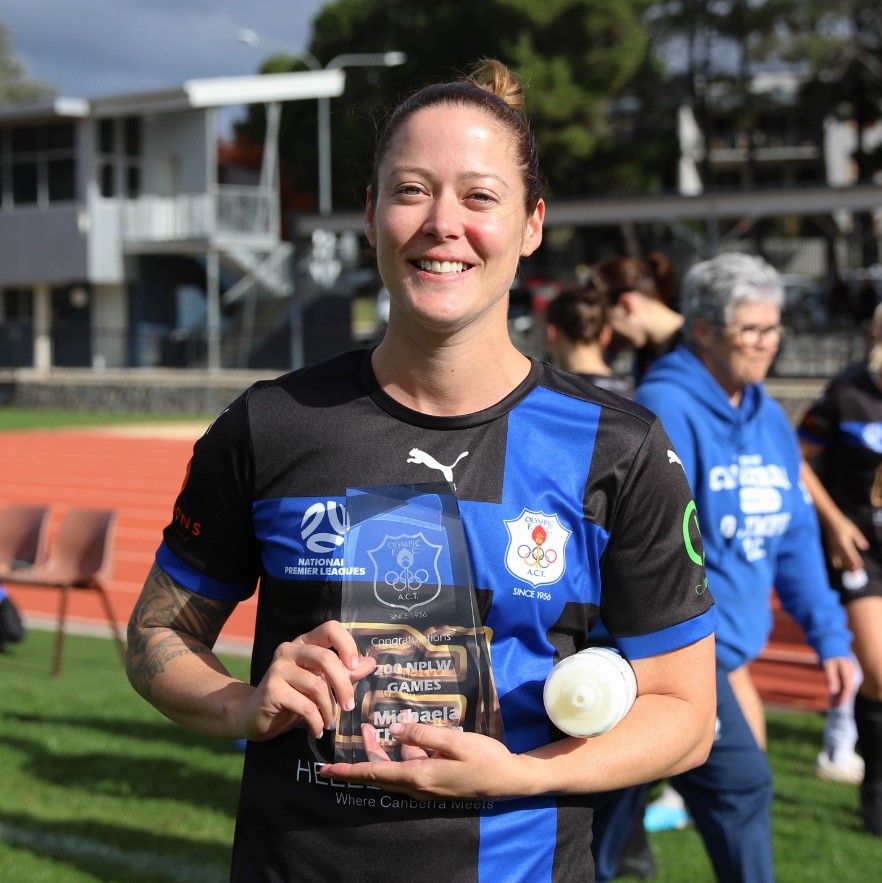
Thornton’s first year of top grade was with the Weston Creek club in 2003. The following year she was selected for the Australian Schoolgirls tour of New Zealand along with Ellie Brush, and another was to follow the year after, to the UK, this time without the slightly older Brush. By this time Thornton was with the ACT Academy of Sport (ACTAS) and the Canberra Eclipse in the last two seasons in the WNSL prior to the competition folding in 2005, four years before the start of the W-League.
“I think I was the youngest ever to play for Canberra Eclipse… I think myself and Courtney Atwood, who is also at [Canberra] Olympic. We were the two little ones. If you mention anything about Canberra Eclipse these days, everyone’s like ‘Who’?
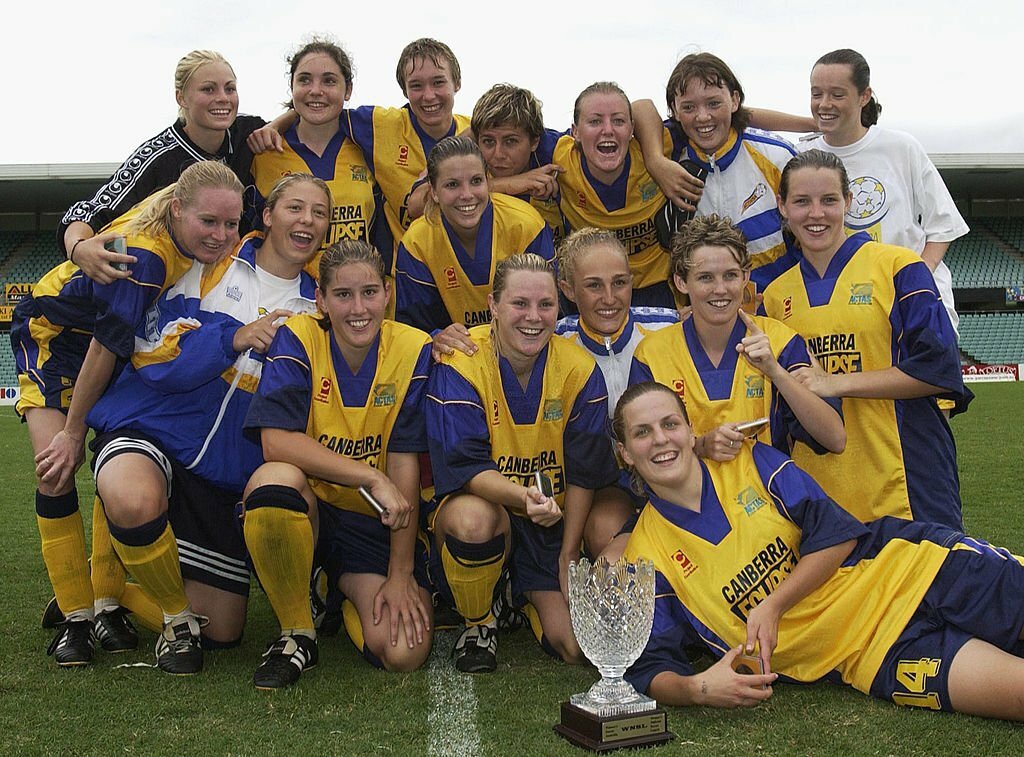

“Most of what I remember is being in awe at the time, all the Matildas pretty much played locally. I think I was maybe 15 when I was playing there in the first season and we had Rhian Davies and Thea Slatyer and Caitlin Muñoz.
“I remember the first game that I played, I think it was against Northern New South Wales. And I had to go on and she was marking me, Cheryl Salisbury. And I was like, ‘this is horrifying!’ [laughs].”
It was also around this time that Thornton was in the frame for the Young Matildas.
“I went on a few camps… never got a gig. I was always the one that was brought in if people were injured or away; I was always just on the cusp. So I’d come into camps, and then not make the squad.”
There would be similar disappointments to come when trialling for Canberra United in the W-League, but these would be more than counter-balanced by success and recognition in the realms of futsal and NPLW.
“I had a bit of preseason with Heather [Garriock], six or eight weeks and there was some initial chat about contracts and those sorts of things. And then I went to Russia for the World Cup, and that’s where Sam proposed to me. So that was a bit exciting. I guess I [may have] lost a bit of focus on football for a little while there. When I came back, the offer was no longer there. And then the next year, Vicki Linton’s first year, I was invited to trial and was the last [one] cut.
“But I don’t know if I, in my later years, was fully committed to it. Because by then, this was only a few years ago, I was working full time, [in our] own business…
“I would have had to change a lot of things in my life to commit to the full time environment that Canberra United is now.”
The end of her time with ACTAS marked the start of her celebrated career at the Belconnen end of town.
“When I left ACTAS, I went to Belco [Belconnen Blue Devils] and then had that first year [there]. And then they said you’ve got to go to Bel West – they were the best team at the time – otherwise you’re never going to be picked up for Canberra United. You’ve got to go to the best team and play with the best players, so I went to Belwest in 2007.”
Thornton was indeed picked up by Canberra United for the inaugural 2008 season under coach Robbie Hooker, as a scholarship player. When Bronwyn Studman was injured for two weeks, Thornton was brought into the matchday squad for that time as an injury replacement.
“I remember the pre-seasons – always just fitness, six to eight weeks of not even touching a ball. Robbie would take us down to the track at the AIS and like run laps and laps and laps. Very old school; now with all the things that we know about human bodies, we know that that actually just makes you break.”
Thornton returned to Belconnen United after her Canberra United experience and remained there until joining Canberra Olympic for the 2022 season. It was a special time under coach Ant Jagarinec, with whom Thornton was able to work again in her capacity as a physiotherapist in the most recent Canberra United season. Jagarinec was assistant coach to Njegosh Popovich for season 2022-23.
Thornton and good friend Katie Woodman were the only two players who played throughout the ten-year Jagarinec Blue Devils dynasty when they appeared in every grand final from 2011. Thornton reflected back to the early days of that era when the club instituted cultural change and made a concerted decision to elevate the women’s programme and become more professional.
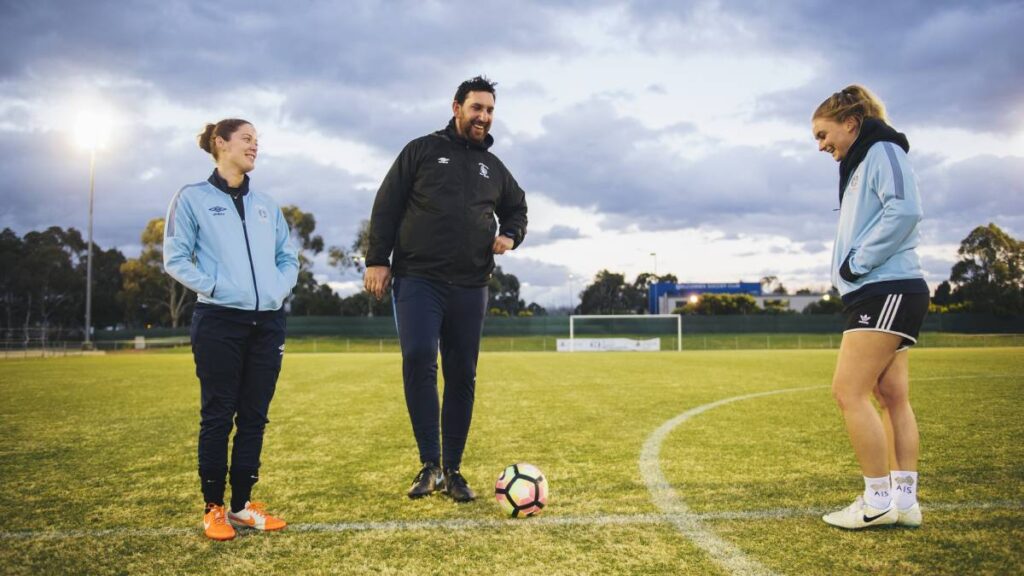

“I was obviously a lot younger then so I wasn’t too involved in getting it all going. That was Ant and the president at the time and all the back office staff in Belconnen but I think it was more just the culture and picking the right people.
I mean, we built it for ages, we had people like Maddie Whittall and Nicole Jalocha playing in reserves for four or five years before they came into first grade, and not getting the shits with that.
“So I guess [having] everyone understanding that there was a process and a pathway to play first grade. We had Caitlin Muñoz and Catherine Brown for a few seasons, but we always talked about all these other teams that had, you know, I think Olympic one year had Grace Maher and Grace Field and Sally Rojahn, all these fantastic players. [Whereas] we had people that had never even played for the ACT and we were beating the teams like that, six or seven nil because everyone wanted to work for each other. Everyone was so well drilled, there was a lot of belief back then.
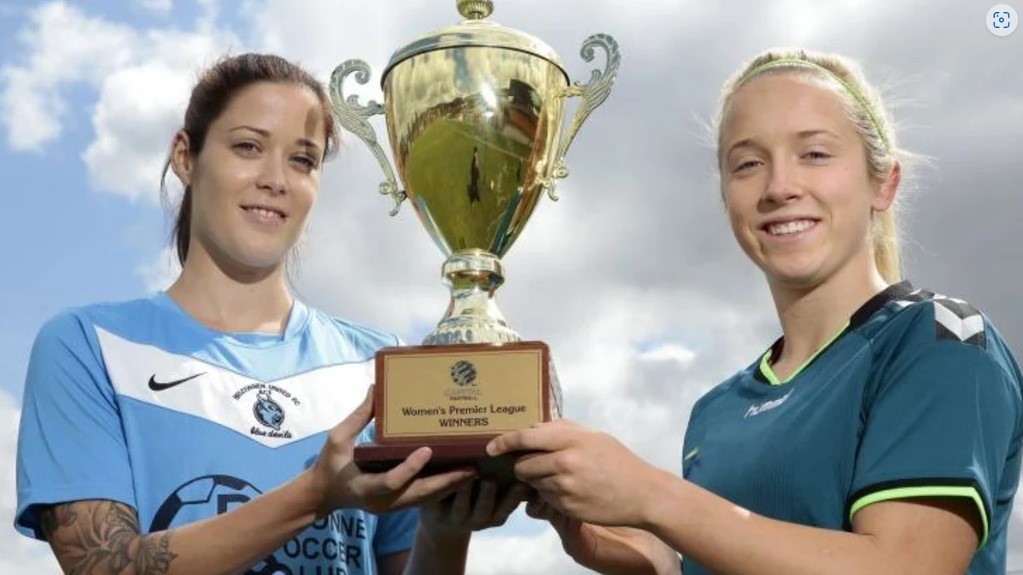

“We weren’t [that] good for a while; I think the first year that we made finals, we scraped into fourth place and then somehow knocked off Weston Creek in the semi-final and then randomly ended up winning. And we were like ‘oh!’, and that was our first grand final win. So we weren’t as astonishing early on, but we stuck with it.
Ant and I obviously spent a lot of time together this [last] Canberra United season. We chatted a few times about how neither of us realized how good we had it and how good we made it at Belco during those years. We’re trying to start something similar now at Olympic, with Njegosh and Ant trying to do the same thing at Canberra United.
A spate of serious injuries in her early senior football years was instrumental to Thornton’s choice of vocation as a physiotherapist.
“I had a lot of injuries in those times [around 2008-09] – both my ACLs and ankle surgery, groin reconstruction – a few things that really kind of got in the way of training consistently. I think I’d had five surgeries by the time I was 21, and thought I’d better study and get a real person job. Back then I think it was $50 a week I was paid to train with Canberra United, so I thought that probably won’t cut it.
“My now business partner Jules – Julian Russell Jones – was our team physio for Canberra United the first 10 years of Canberra United, and also ACTAS the whole time when I was growing up. Every national championships that we went to he was our team physio and so because I was so injury-prone, Jules and I spent quite a bit of time together. When I finished school, he offered me a job in reception at the physio clinic.
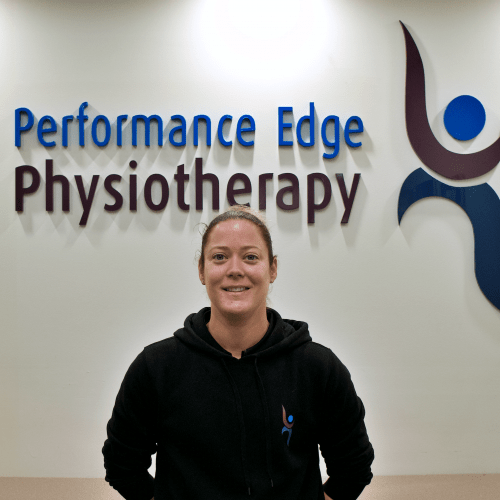

“Being injured so much and just being around and seeing how it all works is probably what triggered me [to take up physiotherapy]. I thought, ‘righto, I need to stop getting injured, taking a bit better care of myself, managing loads, getting a bit stronger in the gym’. I think there was a period of time it might have been six or seven years, I don’t think I missed a single game with injury. And now… just getting a bit old now [laughs] so I think they’re creeping back in.
“I wasn’t born wanting to be a physio; if Jules hadn’t offered me a job, I don’t know what I would have done but it might not have been physio.”
Thornton also credits Jagarinec with helping her manage her loading while at the Blue Devils.
“I’m quite stubborn. There were a number of times when he pulled me out of training if he saw me hobbling around or wincing. I hate missing training and games and was always very annoyed with him, But looking back on it, it was probably an accurate decision.
“In my line of work, I know that there is a correlation between strength and injury rates. So the simple act of getting stronger brings down your likelihood of soft tissue and joint injuries. It helps that our Belconnen clinic is inside CISAC (Canberra International Sports and Aquatic Centre) so I can go to the gym every day at lunchtime.”
The Canberra NPLW landscape was turned upside down during the 2022 pre-season, with Thornton’s signing for Canberra Olympic seemingly starting an avalanche of player movement.
Beginning when Andrew Woodman was head coach prior to Nicole Begg, top-to-bottom positive cultural change in the women’s programme was evident, even to those outside of the club. With the inspirational Begg in charge, momentum reached a crescendo of sorts in that off-season. The extent of the player movements had ripple effects throughout the league and forged the way for Olympic to become part of an elite top three, joining the established top two of Belconnen United and Canberra Croatia.
“I think this is a good platform to discuss it because I think there were a few rumours around about poaching players and calling players. A lot of people said to me, ‘How much money did they offer you?’, and we didn’t even speak about money at all.
“What made Belconnen so special all those years ago for me was the culture, the people around and the support that all the players and the staff had, across the whole board. [A sense of] equality too. We’re never going to get paid the same as men, but the number of women’s games that the President would go to would be the same. Those sorts of things that made you feel like you were at least appreciated. When Ant and a few other people left, for me I just felt like the culture had started slipping a little bit.
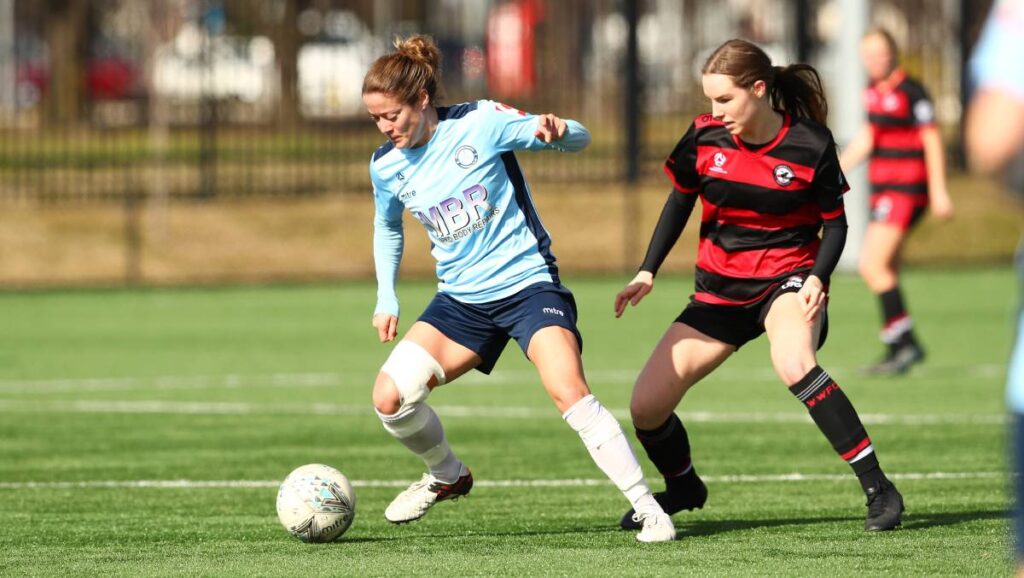

“A bit like marrying the first boy you ever kissed… I thought, why don’t I go and try somewhere different and just see what other places are doing. How do I know if Belconnen’s really good or bad anymore, unless I test something else out?
“I’ve worked for a number of years with the Olympic men’s physio and saw their culture on a game day. Even when I was playing for Belconnen, they were always so nice and friendly. So I first messaged Hamish [Cresswell, Director of Women’s Football] at Belconnen and then the rest of the girls and the staff and said, this is my decision.
“The other names just sort of followed. A couple of others asked me about it, and I said ‘Mate, I’m not your player manager. If you want something to happen, you can be a grown up and you can call [Olympic coach Nicole Begg] yourself’. But you know, I didn’t ask anyone to come.
“I loved it [first season at Olympic]. I think it was exactly what I was hoping it would be, which is sort of like what Belconnen used to be in the glory days, just with the whole vibe and the culture and everyone, even the guys running the canteen, you know? Everyone was just so supportive and happy to have us there. And having Sarah [Johnston] come across, she played 6 which meant that I could play a little bit higher in 8. [When we had the same configuration] at Belconnen I think I was our leading goal scorer that year. Then last year, I was equal with Ash Sykes, which was nothing to sneeze at, being in the midfield. I’ve personally enjoyed being able to score more goals, but I’m back to 6 now because Sarah’s gone [to Victorian NPLW].
“We won the grand final, and they gave me player of the year which is voted by the other players. [That’s] something really special because a lot of those girls I hadn’t really played with before.”
Thornton is contemplative when asked about the current state of the league and the movement of players to the Football NSW competition.
“I’ve never really thought about moving to Sydney. Even the first year I was Jules’ receptionist I told him that I’m going to be buying bits of this off you guys when I graduate. So I think for me, I’ve always planned to stay here and work, and that’s been my priority, really.
“I don’t know if it’s a bit of a myth that you have to go to Sydney or Melbourne or wherever to play to get picked up for Canberra United. All these girls go there thinking they need to do that, which isn’t correct. Lauren Keir never went, Jessie [Rasschaert], even Sammy Woods ages ago.
“I do agree that their competitions are stronger as a whole. There’s probably not much between their first and second teams and their 5th and 6th or 9th. You could almost throw a blanket over them in terms of the quality of the players that they have. Whereas in our league, our top two or three teams can compete with Sydney’s top two or three teams, but our eighth team wouldn’t come close to Sydney’s eighth team.
“And we know that because for a while there we were having a game where the winner of the Canberra league would play the winner of the Sydney league. We played Sydney Uni two years in a row with Belconnen and I think we lost in injury time 1-0 the first one and then lost 2-1 the second time. So the quality of our players is not in question. It’s the number of quality players… because Canberra’s so small, it’s hard to have a really really competitive league with eight teams.”
As well known as Thornton is on grass fields around Canberra, it’s on the futsal court where she has achieved recognition at the highest level, captaining Australian teams at international competitions. While both forms of the game hold equal weight in her eyes, there are aspects of playing futsal that really appeal to her.
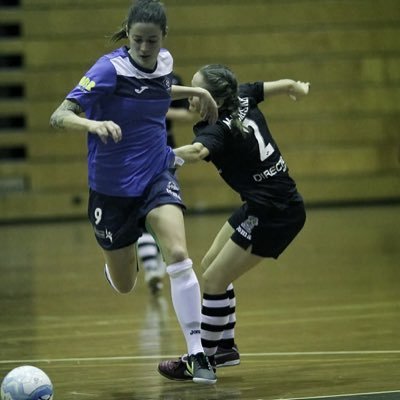

“I’ve always loved futsal, but I love different things about [each]. Whether it’s the game or the people that are involved, or the way the season runs, they’re just so different.
I’m definitely better at futsal than I am at outdoor.
“It’s not the same range of passing as outdoor football – it’s all shorter, sharper, quicker. I’d like to say I’m better at futsal, because I’m smarter, because it moves so quickly. If you can think one or two phases of play ahead, then you’re automatically winning. A lot of players and especially young players, they just think ‘I get the ball, now what am I going to do with it’ as opposed to ‘If I get the ball here, and I’ll pass it to so and so and then so and so, we’ll get it and then they’ll pass it there. Then if I’m here, I’ll get the cut-back’.
“And every time the ball goes out, it’s a set piece as well. So it’s a bit more tactical in that sense. I remember our tour to Thailand, April last year. That was unreal playing teams like the Thailand national team. Every time the ball goes out, you’re going, ‘oh my god, what are they going to do?’ They’ve got about 800 set pieces that they do, kick-ins from the side, and they match up players every time. Every time we made a substitution or interchange, they had someone matched up to one of us. So if I was a bit bigger and stronger, they switched.
“I loved the Thailand tour, it was so well organized. We had a really good group of girls, lots of Canberra girls were invited on that tour. So that was nice, and then we did a World Championships in Spain, in September last year, but heaps of teams pulled out with COVID. But the most recent one, the trip to Argentina, was probably the most professional tour after Thailand, or perhaps on par with Thailand.”
There is no central governing body for futsal at the national level but other countries face the same challenge, and while not an ideal situation, in some ways it can open opportunities.
“Football Australia’s priority is outdoor [football] with the Matildas and the Socceroos and all that, which is fine. It’s just frustrating because what happens is we dilute the other teams that we’re playing in. Because there’s no FA Women’s National Team, there are two other futsal governing bodies that are fighting, AFA and FAF. So there are two Australian national women’s teams. With the politics of things some players only want to play for AFA and some players only want to play for FAF, so we don’t always go away with the strongest team.
“I don’t mind so much; I get to play lots of futsal because I don’t care who I play for. I’ve probably played an even amount for both.”
It’s more common these days but Thornton has long been a striking figure on Canberra pitches not just for her undoubted skills, but also for the tattoo art that adorns her.
“The first one was drawn by my friend in maths class, it was a soccer ball. And I thought that’s pretty cool, I’ll get that tattooed on my calf. Because I was 16 I had to have permission from my parents to get it. Even back then I always knew if I get them, I can get them easily removed, which I have done. So there were a few that I just was like, wow, this is pretty cool, I’ll get this.
“With my sleeve, a few people quite close to me, my uncle and a really close friend, passed away. I thought if I’ve got a tattoo which was [less significant], I have to get something for them. So the first bit I started with at the bottom – my twin sister has the same [Latin] phrase:
‘Sic transit gloria mundi’, it means ‘thus passes the glory of the world’.
“My uncle had a big tattoo of that across his chest, he had both nipples pierced, and he was a bit of a yahoo… he was in China at the time [of passing], on holiday. Apparently, that’s how they identified his body.
“With my friend, we were going to get matching tattoos. The one here is like a big koi fish. He got it [first]. And then I said, Yeah, I’m getting it, I just don’t have time. And then he passed away, drowned… I felt so bad, I was like, ‘Oh, I’ve got to get it now’.
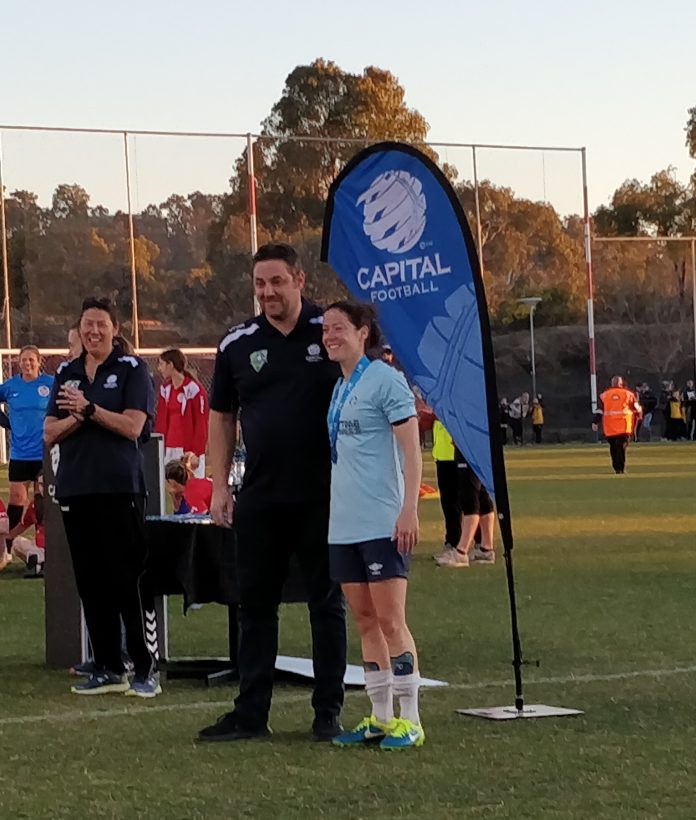

“The rest is just a bit of fiddling around the sleeve. My most recent is gumnut babies. My twin thought we should get them because that’s what we used to read when we were little. At this point, I’ve got so many, why not? Our youngest sister [got one] as well… three gumnut babies”.
Whatever her future in and around the beautiful game, Thornton is quite certain it doesn’t involve coaching.
“I’m pretty adamant that I would be a terrible coach, I don’t think I’ve got that in me.
It’s really simple for me when I stop playing. Normally I work Saturday with the men’s and then usually Sunday mornings, I’ll work pretty much up until we’ve got to be at our game. So for me, it just means I would not play and just work at one extra game on the weekend.
“When I stop playing – whenever it comes, whenever Nic tells me to bugger off – I’m very keen to play in reserve grade and be able to put my feet up after and have a beer and cheer the first grade. That’s something I’m looking forward to. But I think for the next 5 to 10 years, I’ll still be at soccer every weekend.”
Beyond 90 thanks Michaela and wishes her the best for her future.
Follow all our Canberra local football stories here.





